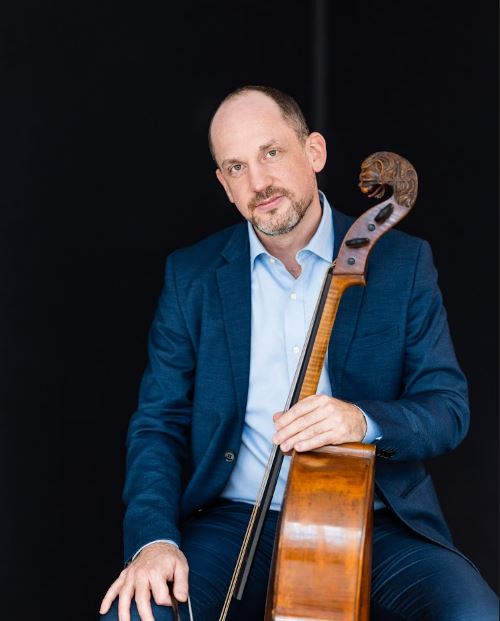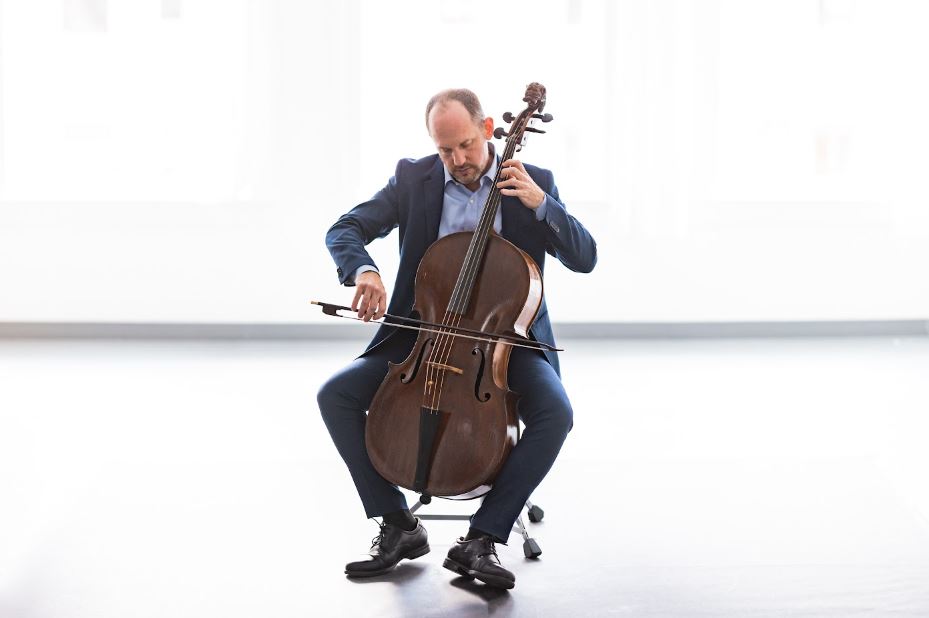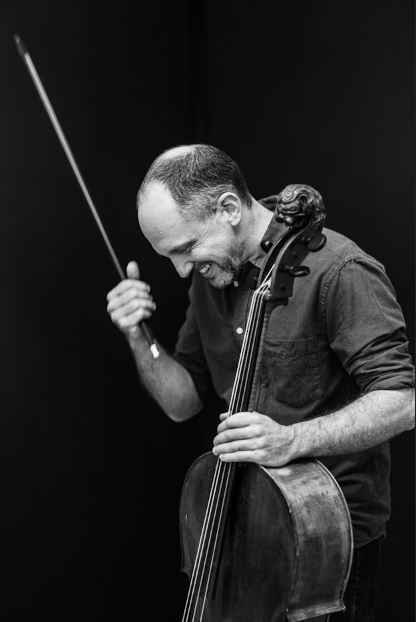
Welcome to the Tafelmusik family! What drew you to join Tafelmusik, and what aspect of playing with our ensemble are you most looking forward to?
Thank you so much! I think “the Tafelmusik family” is an apt description and that’s very much what’s drawn me to the ensemble. I already feel so at home and so welcome here, and that really speaks to that family ethos. A love for—and a dedication to—the group is a given. There is such a sense of ownership and care; everyone is able to be themselves, and with that, everyone is able to contribute something very personal to the whole. All of that adds up to the sort of culture I’m very much drawn to. I couldn’t be more grateful and excited for this opportunity.
Also, welcome to Toronto! You are originally from Vancouver, but have spent many years in the US. How does it feel to move back to Canada, and what part of living in Toronto are you most excited about?
It feels so good to be coming back north of the border! I moved to the States for my undergrad and I guess I’ve now lived there as long as I lived in Canada, about eighteen years, which is a bit staggering to me. Especially amidst the challenges of the last several years, the importance of family is very much front of mind, and to be that much closer to them (in Ottawa, Calgary, and Vancouver) means so much.
Regarding Toronto specifically, I’m a bit embarrassed to admit this, but it’s a city I still don’t know all that well! As a youngster my musical communities were primarily Vancouver, Banff, and Calgary; then after high school my studies and career have been primarily centred in the eastern US. I do abide a good deal of wanderlust and love exploring new places so I’m looking forward to that, as well as reconnecting with a few very dear friends who are in town.
And not to … over-flex my Canadian bonafides, but I did grow up pretty serious about hockey. I even played pick-up games from time to time in Boston, so I’m very much looking forward to getting back into that! And in case you’re wondering, yes, I am and will remain a Canucks fan, as trying as that path may be.
What initially attracted you to the cello as an instrument?
It seems it was somewhat fated. I only have vague memories of this, but I used to tag along to my older brothers’ violin classes when I was very little and apparently I had the tendency to stealthily sneak out of the room and into the cello class next door. I guess my parents took that as a hint and they soon signed me up for cello lessons with Judy Fraser, whose influence in my musical upbringing can’t be overstated. She is such an imaginative teacher for wee cellists and a great foundational teacher overall. I studied with her from age five until college.

Follow up: if you had to play an instrument that wasn’t the cello, what would it be and why?
For the purposes of unlocking the secrets of harmony and composition I wish I played a keyboard or plucked instrument. And for the sake of unlocking the secrets of rhythm and groove I wish I played percussion or drums. Basically, I long to be a one-man-band … or continuo section, and I love that there’s some telling overlap there.
How did you initially encounter baroque music and historically informed performance? What made you want to specialize in period performance?
It came in stages. Growing up I heard a lot of early music on the CBC—a lot of Tafelmusik, of course! Then I did my undergrad in Boston which is a real hotbed: three professional baroque orchestras in one city(!): Handel + Haydn, Boston Baroque, and the Boston Early Music Festival Orchestra. When I was a student I was able to join Harvard’s Baroque Chamber Orchestra as an extra for a couple years, which granted me the use of an instrument and introduced me to Phoebe Carrai, who eventually became my teacher.
I also studied for a year in Barcelona, which is steeped in historical performance, mostly folk music played in the streets (shawms everywhere!). It was also where I first heard Jordi Savall and Hesperion XXI, and their work really clued me into many of the things I love most about historical performance—the emphasis on improvisation and groove, and the possibilities of programming—and I think that is ultimately what tipped me over the edge.
Can you tell us more about your chamber group A Far Cry?
A Far Cry (AFC) is a Boston-based (modern instrument) string chamber orchestra that’s been a huge part of my musical life for the last twelve years. The group is collectively run and directed: all 18 performers are co-artistic directors, so all artistic decisions are made together, from submitting, discussing, and voting on programs to running rehearsals. We also rotate section leadership, similar to Tafelmusik. The pros and cons call to mind that saying about democracy: the worst form of government, except for all the others. The challenges are really mitigated by the fact that the model creates an inherent sense of engagement, and it teaches some helpful lessons along the way, too, about trusting yourself and staying humble. When the group incorporates your vision it’s quite empowering, but if things are working as they should, you only experience “getting your way” about 1/18th of the time. Mostly you’re supporting and elevating other peoples’ ideas, but doing so from a stance of knowing what it’s like to put yourself out there.
I get a very similar feeling from Tafelmusik—the sense of engagement, ownership, camaraderie—and I’m curious to better understand what has fostered that. Although AFC doesn’t use historical instruments, a part of me wonders if it’s the group that may have done the most to prepare me for this new position.
And if I might filibuster this answer just a bit, if only because I’d be remiss in not mentioning it: the co-artistic directorship aspects of AFC very much led to my other main gig at the moment, which is working in an administrative role as the artistic director for Five Boroughs Music Festival (5BMF), a chamber music series in New York City. We’re very much a small and scrappy organization, and as the name suggests we present concerts all over the city. In the last year we’ve been to the South Bronx, Harlem and NOHO in Manhattan, Prospect Park in Brooklyn, Flushing in Queens, and Stapleton in Staten Island. My interest in the extra behind-the-scenes work, both with AFC and 5BMF, was very much inspired by the realization that chief amongst my musical heroes are Tom and Isobel Rolston, who I knew when I was a young student as the directors of the Banff Centre. To me they epitomize the enormous difference that can be made through creating the ideal circumstances for creative work, and because of them I have enormous respect for those who carry that out, whether it be administrative staff or the artists themselves.
You are a faculty member at this year’s Tafelmusik Baroque Summer Institute. Have you participated in TBSI before? If not, what part of inspiring and educating tomorrow’s period performers is most exciting to you?
I never attended TBSI as a student, something I very much regret given how fond I already am of my Tafelmusik colleagues—I could’ve known them so much sooner! I had a pretty busy gig life by the time I started playing baroque cello, so my summers tended to be reserved for work (is my excuse).
One of the things that’s on my mind as it relates to working with students is addressing the aura of “judginess” that surrounds classical music. Yes, what we do is difficult, requires rigorous work and training, and in historical performance there’s an additional layer of research and knowledge that comes into play. In the end, though, we’re seeking clarity of communication, a direct conduit, and if too much emphasis is placed on the work and rigour itself, or if sliding scales between good and bad are imposed, that end goal gets lost so easily. I’ve learned that lesson the hard way in working with A Far Cry: for instance, saying “let’s work on intonation here” will always bear a better result than “we’re out of tune” (to paraphrase an often harsher statement). If you have a vision for where you want to go, negative comments become almost entirely unnecessary. Of course it’s also important to learn how to internally translate any sort of feedback you receive, however it might be delivered, into something useful.

We understand that you received two GRAMMY nominations in 2019 (congrats!), for recordings with A Far Cry and Boston Baroque. What was that experience like? And where can listeners find your music?
Those were both very happy surprises! Unfortunately neither prevailed as the winner, but being a runner-up to the Kronos Quartet and James Ehnes doesn’t hurt all that bad. For all the excess and occasional weirdness of the GRAMMYs, at its core it’s musicians celebrating other musicians across all genres, which is a heartwarming thing to be a part of.
I’ve recorded a few albums now with A Far Cry, and a couple others have come out in the last year with the vocal ensembles Lorelei (Antigone) and The Thirteen (The Outer Edge of Youth). I actually haven’t been a part of many recording projects on baroque cello, funnily enough, but Boston Baroque has been live-streaming its concerts of late, and I played in a project that 5BMF produced late in 2020 with my dear friends Elliot Figg and Manami Mizumoto (the only instance in which I played on my own series… normally that’s avoided ).
What has been your proudest moment as a musician?
That’s a difficult question to answer, mostly because all of the moments and accomplishments that are coming to mind were very much collectively achieved, which is a beautiful dichotomy, really: that so often we are simultaneously both essential and unimportant.
Being invited to join Tafelmusik is, of course, both the correct and truest answer to this! It really is an immense honour, a tremendously exciting opportunity, and a huge relief! It was also quite overwhelming to take stock of all the advice and guidance I received, whether given in the immediate run-up or in the years before, without which I’m quite sure I wouldn’t have been successful.
But in case you were looking for a less … predictable answer: I’m also quite proud of the work that 5BMF and our artists have done since the pandemic to keep compelling projects happening: our digital concerts with Elliot Figg, the Argus Quartet, and Oracle Hysterical x Hub New Music were quite special. We also just completed a major commissioning project, the Five Borough Songbook, Volume III, that involved a cohort of 27 phenomenal musicians including singers from Kaleidoscope Vocal Ensemble, that we presented in all five NYC boroughs.
With A Far Cry, it was kind of surreal to see our latest album, The Blue Hour, make it onto NPR’s top 10 list of 2022, sharing space with the likes of Beyoncé and Bad Bunny. I had a central operational role in coordinating that project in its early stages, as well as performing and recording it, so it feels particularly great to see it flourishing. But again, the lion’s share of the pride (pardon the pun) and credit belongs to the composers, soloists, producers, and the orchestra as a whole.
What music are you listening to and loving recently, baroque or otherwise?
I’m loving Montreal-based Space Time Continuo’s new album Pachelbel: Magnificat Fugues; in addition to having one of the best group names ever, their work unearthing and bringing this music to life achieved such a joyful result.
In my constant study of groove, I often turn to Vulfpeck, a funk band I’d actually argue are proponents of historical performance as they draw inspiration from—and often collaborate with—legendary session musicians of past generations: generally not household names, but phenomenal musicians who were a part of legendary Motown bands and the like. They also do make the occasional nod to baroque music in tracks like “Fugue State” and “Bach Vision Test.”
On the purely baroque side of groove, I’m also a bit obsessed with Ensemble Correspondence’s album Ballet Royale de la Nuit, for the way the instruments layer and fulfill their distinct roles in creating swing.
For a good hit of duende (I’ll let you look it up …) I often listen to Gillian Welch’s Time (the Revelator): besides the beautiful soulful singing and songwriting, it breaks so many rules (like its closing 15 minute-long strophic song) and it totally works.
And a final obsession of late that really combines all these elements—of sparking curiosity, groove, and duende—is the Wu-Tang Clan’s debut album Enter the Wu-Tang (36 Chambers). I originally came back to it via my work with 5BMF, wanting to delve deeper into Staten Island’s cultural history, which is where the group is from. The backing tracks in particular, created by the RZA, blow my mind, especially knowing that they were created using found sounds, collected, altered, and mixed using cassette tapes and records and with whatever technology was available in the early 1990s. Granted I’m a bit of a luddite, but it’s like magic to me.
What’s Michael Unterman listening to these days? Discover his playlists on Spotify or YouTube below.
Which Tafelmusik concerts and/or repertoire are you most looking forward to performing this season?
I really can’t choose! I think this season I’m so focused on coming in every week with an open mind, soaking up and savouring as much as possible. The city, the organization, even the guest directors are all new to me. My priority is really to slot in and start contributing in a meaningful way as quickly and seamlessly as possible.
What’s something we should know about you that isn’t in your biography?
I met Ava, my sweetie of five years, via baroque cello; she was the soprano soloist for Boston Baroque’s Messiah back in 2017. Maybe there’s a lesson in there for the TBSI students: always be a responsive and sensitive collaborator, because you never know!
Anything else you’d like to tell us about yourself?
I think I’ve said quite enough!
